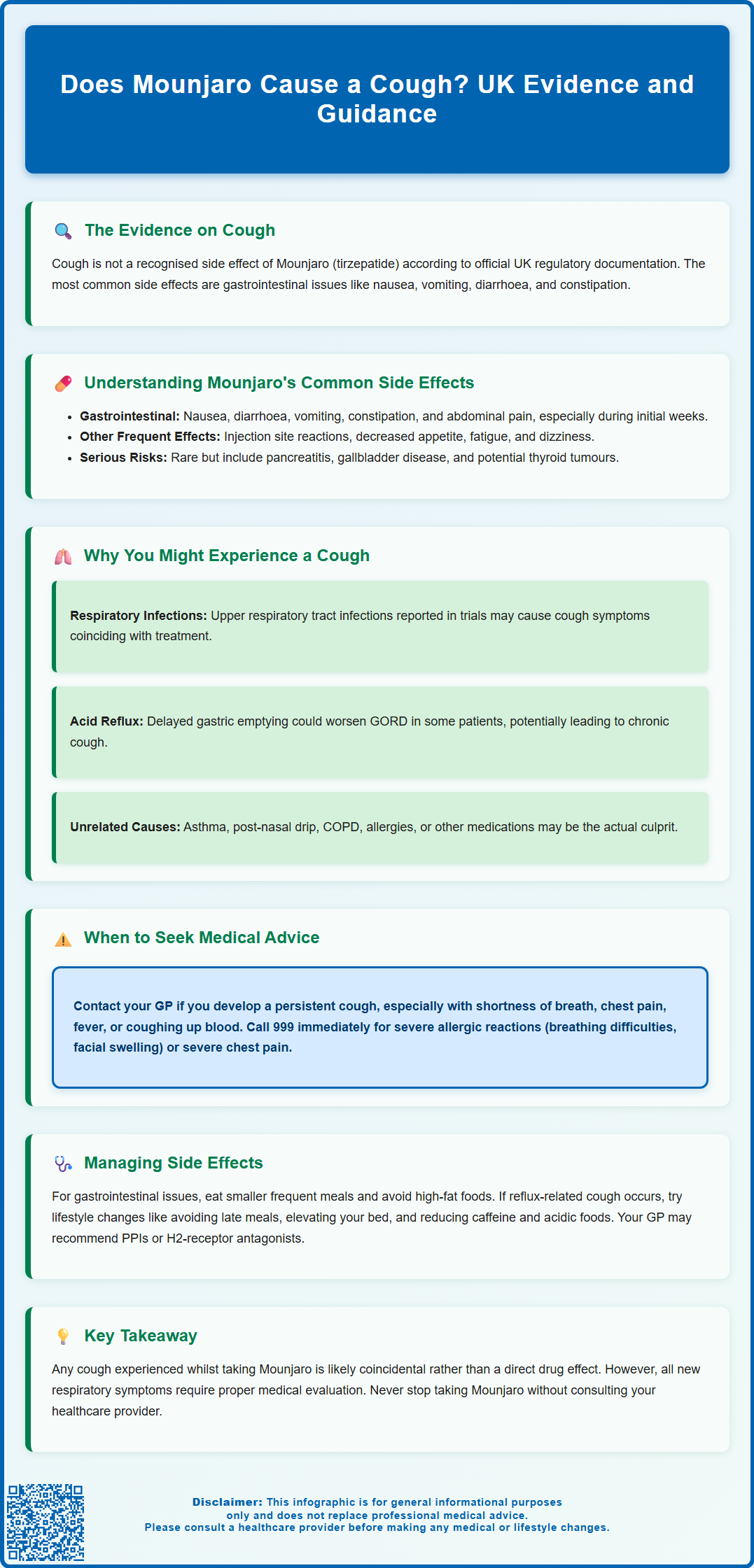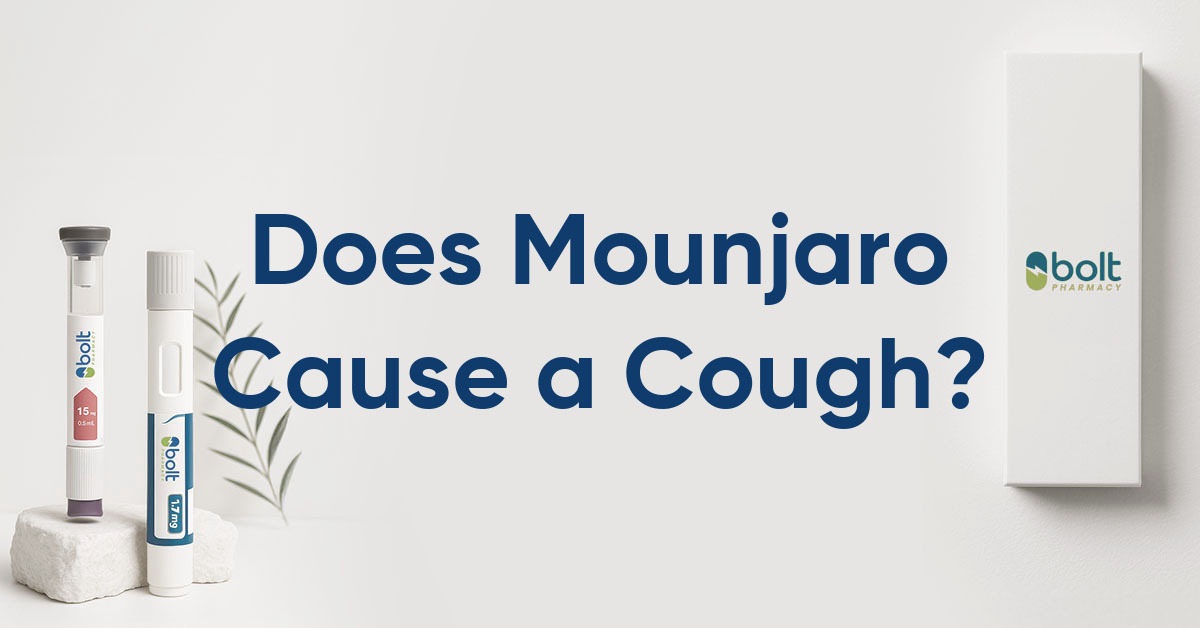Does Mounjaro cause a cough? This is a common concern amongst patients prescribed tirzepatide for type 2 diabetes. Mounjaro (tirzepatide) is not associated with cough as a recognised side effect according to UK regulatory data. The most frequently reported adverse reactions are gastrointestinal, including nausea, vomiting, and diarrhoea. However, upper respiratory tract infections are commonly reported in clinical trials and may present with cough symptoms. This article examines the evidence surrounding Mounjaro and respiratory symptoms, explores the medication's established side effect profile, and provides guidance on when to seek medical advice if you develop a cough whilst taking this treatment.
Summary: Mounjaro (tirzepatide) is not associated with cough as a recognised side effect according to UK regulatory data and clinical trials.
- Tirzepatide is a dual GIP and GLP-1 receptor agonist licensed for type 2 diabetes treatment in the UK.
- The most common side effects are gastrointestinal, including nausea, vomiting, diarrhoea, and constipation.
- Upper respiratory tract infections reported in trials may coincidentally present with cough symptoms.
- Delayed gastric emptying caused by tirzepatide may theoretically exacerbate gastro-oesophageal reflux, potentially leading to cough.
- Seek medical advice if you develop persistent cough, particularly with breathlessness, chest pain, fever, or haemoptysis.
- Do not discontinue Mounjaro without consulting your healthcare provider, as this may affect diabetes control.
Table of Contents
Does Mounjaro Cause a Cough?
Mounjaro (tirzepatide) is not associated with cough as a recognised side effect. According to the Summary of Product Characteristics (SmPC) approved by the Medicines and Healthcare products Regulatory Agency (MHRA), cough is not listed as an adverse reaction. The most common side effects of Mounjaro relate to the gastrointestinal system, including nausea, vomiting, diarrhoea, and constipation, which affect a significant proportion of patients, particularly during dose escalation.
It is worth noting that upper respiratory tract infections and nasopharyngitis are commonly reported in clinical trials and these conditions may present with cough symptoms.
Individual responses to medications can vary considerably. Whilst there is no established link between tirzepatide and respiratory symptoms such as cough, some patients may experience coincidental respiratory issues whilst taking the medication. These could be unrelated to Mounjaro itself and may stem from concurrent infections, allergies, or pre-existing respiratory conditions.
Post-marketing surveillance continues to monitor all potential adverse effects that may not have been apparent during clinical trials. If you develop a persistent cough after starting Mounjaro, it is essential to consider other possible causes, including upper respiratory tract infections, gastro-oesophageal reflux disease (GORD), or environmental factors. The timing of symptom onset in relation to medication initiation can provide valuable clinical information.
This article examines the evidence surrounding Mounjaro and respiratory symptoms, explores the medication's established side effect profile, and provides guidance on when to seek medical advice if you develop a cough whilst taking this treatment for type 2 diabetes.
Understanding Mounjaro and Its Common Side Effects
Mounjaro (tirzepatide) is a dual glucose-dependent insulinotropic polypeptide (GIP) and glucagon-like peptide-1 (GLP-1) receptor agonist licensed in the UK for the treatment of type 2 diabetes mellitus. It represents an advancement in incretin-based therapies, working through two complementary mechanisms to improve glycaemic control and promote weight loss. For weight management in adults with obesity or overweight with weight-related comorbidities, tirzepatide is available in the UK under the brand name Zepbound.
The medication functions by enhancing insulin secretion in a glucose-dependent manner, meaning it stimulates insulin release only when blood glucose levels are elevated, thereby reducing the risk of hypoglycaemia. Simultaneously, tirzepatide suppresses glucagon secretion, slows gastric emptying, and promotes satiety through central nervous system pathways, contributing to reduced caloric intake and weight loss.
The most frequently reported adverse effects of Mounjaro are gastrointestinal in nature. Clinical trials have demonstrated that nausea, diarrhoea, vomiting, constipation, dyspepsia, and abdominal pain are common, particularly during the initial weeks of treatment and following dose increases. These effects typically diminish over time as the body adapts to the medication. The MHRA-approved prescribing information recommends gradual dose escalation to minimise gastrointestinal tolerability issues.
Other recognised side effects include:
-
Injection site reactions (erythema, pruritus, swelling)
-
Decreased appetite (which contributes to the weight loss effect)
-
Fatigue and dizziness
-
Increased heart rate (modest increases observed in clinical trials)
-
Hypoglycaemia (particularly when used with insulin or sulfonylureas)
Serious but rare adverse effects include pancreatitis (persistent severe abdominal pain, sometimes radiating to the back, with or without vomiting), gallbladder disease (right upper quadrant pain, nausea, vomiting), and potential thyroid C-cell tumours (observed in rodent studies, though relevance to humans remains uncertain).
Important safety information: Tirzepatide may reduce the effectiveness of oral contraceptives, particularly when starting treatment or increasing the dose. Additional contraceptive methods are recommended for 4 weeks after initiation and after each dose increase. If you suspect pancreatitis, stop taking tirzepatide immediately and seek urgent medical assessment.

Respiratory Symptoms Reported with Mounjaro
Respiratory symptoms, including cough, are not listed as adverse reactions in the UK SmPC for Mounjaro (tirzepatide) based on the pivotal clinical trial programme (SURPASS trials) that led to its regulatory approval. The comprehensive safety data from these large-scale studies did not identify cough as a characteristic side effect of the medication. This distinguishes Mounjaro from certain other medication classes, such as ACE inhibitors, where cough is a well-established and frequent adverse reaction.
It is worth noting that upper respiratory tract infections and nasopharyngitis are commonly reported in clinical trials and these conditions may present with cough symptoms, which could explain coincidental cough in some patients taking tirzepatide.
Post-marketing surveillance and real-world clinical experience continue to gather information about less common reactions that may not have been apparent during controlled trials. Some patients have reported respiratory symptoms whilst taking GLP-1 receptor agonists, though establishing causality remains challenging. These reports are relatively infrequent and may represent coincidental occurrences rather than drug-induced effects.
Several mechanisms could theoretically explain respiratory symptoms in patients taking Mounjaro, though none are definitively established:
-
Gastro-oesophageal reflux disease (GORD): The delayed gastric emptying caused by tirzepatide (noted in the SmPC) may theoretically exacerbate reflux symptoms in susceptible individuals, potentially leading to chronic cough through aspiration or irritation of the airways
-
Allergic or hypersensitivity reactions: Though uncommon, any medication can potentially trigger allergic responses, which may include respiratory manifestations
-
Coincidental respiratory infections: Patients may develop upper respiratory tract infections unrelated to their diabetes medication
It is crucial to consider alternative explanations for cough in patients taking Mounjaro. Common causes of chronic cough in the general population include asthma, GORD, post-nasal drip, chronic obstructive pulmonary disease (COPD), and medication side effects from other drugs (particularly ACE inhibitors). A thorough medication review and clinical assessment are essential to identify the underlying cause of respiratory symptoms.
If you develop cough with features of anaphylaxis or angioedema (such as facial swelling, difficulty breathing, or swallowing difficulties), discontinue tirzepatide immediately and seek urgent medical attention.
When to Seek Medical Advice About Cough While Taking Mounjaro
You should contact your GP or healthcare provider if you develop a persistent cough whilst taking Mounjaro, particularly if it is accompanied by other concerning symptoms. Whilst cough is not a recognised side effect of tirzepatide, any new or worsening respiratory symptom warrants clinical evaluation to exclude potentially serious underlying conditions.
Seek medical advice promptly if your cough is associated with:
-
Shortness of breath or difficulty breathing (may indicate respiratory infection, heart failure, or allergic reaction)
-
Chest pain or tightness (requires urgent assessment to exclude cardiac causes)
-
Fever, night sweats, or unexplained weight loss (may suggest infection or other systemic illness)
-
Coughing up blood (haemoptysis) (always requires immediate medical evaluation)
-
Persistent hoarseness or voice changes (may indicate laryngeal pathology)
-
Symptoms of severe allergic reaction (facial swelling, rash, wheezing, or difficulty swallowing)
Call 999 or attend A&E immediately if you experience:
-
Severe allergic reaction (anaphylaxis) with breathing difficulties, severe facial swelling, or collapse
-
Severe chest pain
-
Severe breathlessness
-
Significant haemoptysis (coughing up large amounts of blood)
British Thoracic Society guidance on the assessment of chronic cough (lasting more than 8 weeks) recommends a systematic approach to identify the underlying cause. Your GP will likely take a detailed history, including the timing of cough onset in relation to starting Mounjaro, the character of the cough (dry or productive), and any associated symptoms. A thorough medication review is essential, as multiple drugs can contribute to respiratory symptoms.
Investigations that may be considered include:
-
Chest X-ray (to exclude structural lung disease, infection, or malignancy)
-
Spirometry (to assess for asthma or COPD)
-
Full blood count (to identify infection or other haematological abnormalities)
-
Trial of treatment for common causes (such as GORD or post-nasal drip)
Do not discontinue Mounjaro without consulting your healthcare provider, as abrupt cessation may affect your diabetes control. Your doctor can assess whether the cough is likely related to the medication and discuss appropriate management strategies or alternative treatments if necessary. However, if you suspect a severe allergic reaction or pancreatitis, stop taking tirzepatide immediately and seek urgent medical attention.
Managing Side Effects and Alternative Treatments
If you experience side effects whilst taking Mounjaro, several strategies can help improve tolerability without necessarily requiring discontinuation of the medication. For gastrointestinal symptoms, which are the most common adverse effects, eating smaller, more frequent meals, avoiding high-fat foods, and staying well-hydrated can provide relief. The gradual dose escalation schedule recommended by the manufacturer is specifically designed to minimise these effects.
For patients who develop a cough that is determined to be related to gastro-oesophageal reflux (a potential consequence of delayed gastric emptying), lifestyle modifications and medical management of GORD may be beneficial. These include:
-
Avoiding large meals close to bedtime
-
Elevating the head of the bed
-
Reducing intake of caffeine, alcohol, and acidic foods
-
Proton pump inhibitors (PPIs) or H2-receptor antagonists as prescribed by your GP
Important safety information: Tirzepatide may reduce the effectiveness of oral contraceptives, particularly when starting treatment or increasing the dose. Additional contraceptive methods are recommended for 4 weeks after initiation and after each dose increase. If you are taking insulin or sulfonylureas alongside tirzepatide, these doses may need to be reviewed and adjusted to reduce the risk of hypoglycaemia.
If the cough is confirmed to be directly related to Mounjaro and cannot be managed with supportive measures, your healthcare provider may consider alternative treatments for type 2 diabetes. Options include:
-
Other GLP-1 receptor agonists (such as semaglutide or dulaglutide), though these share similar mechanisms and side effect profiles
-
SGLT2 inhibitors (such as dapagliflozin or empagliflozin), which work through different mechanisms and have cardiovascular and renal benefits
-
DPP-4 inhibitors (such as sitagliptin), which have a more modest effect on glycaemic control and weight
-
Metformin (if not already prescribed), which remains the first-line treatment for type 2 diabetes according to NICE guidelines
-
Insulin therapy (for patients requiring more intensive glycaemic control)
For weight management specifically, alternatives to tirzepatide (Zepbound) include semaglutide 2.4 mg (Wegovy), which is approved by NICE for managing overweight and obesity, orlistat, or comprehensive lifestyle intervention programmes. NICE recommends that pharmacological treatments for obesity should always be used alongside dietary modification, increased physical activity, and behavioural interventions.
Regular follow-up with your healthcare team is essential to monitor treatment efficacy, manage side effects, and adjust therapy as needed. Your diabetes specialist nurse or GP can provide ongoing support and ensure that your treatment plan remains optimised for your individual circumstances and tolerability profile.
If you suspect you are experiencing side effects from Mounjaro or any medication, you can report these through the MHRA Yellow Card scheme (yellowcard.mhra.gov.uk), which helps monitor the safety of medicines in the UK.
Scientific References
Frequently Asked Questions
Is cough a recognised side effect of Mounjaro?
No, cough is not listed as an adverse reaction in the UK Summary of Product Characteristics for Mounjaro (tirzepatide). The most common side effects are gastrointestinal, such as nausea, vomiting, and diarrhoea.
What should I do if I develop a cough whilst taking Mounjaro?
Contact your GP or healthcare provider for clinical evaluation, particularly if the cough is persistent or accompanied by breathlessness, chest pain, fever, or other concerning symptoms. Do not stop taking Mounjaro without medical advice.
Can Mounjaro cause respiratory infections?
Upper respiratory tract infections and nasopharyngitis are commonly reported in clinical trials of Mounjaro. These infections may present with cough symptoms but are not caused directly by the medication itself.
The health-related content published on this site is based on credible scientific sources and is periodically reviewed to ensure accuracy and relevance. Although we aim to reflect the most current medical knowledge, the material is meant for general education and awareness only.
The information on this site is not a substitute for professional medical advice. For any health concerns, please speak with a qualified medical professional. By using this information, you acknowledge responsibility for any decisions made and understand we are not liable for any consequences that may result.
Heading 1
Heading 2
Heading 3
Heading 4
Heading 5
Heading 6
Lorem ipsum dolor sit amet, consectetur adipiscing elit, sed do eiusmod tempor incididunt ut labore et dolore magna aliqua. Ut enim ad minim veniam, quis nostrud exercitation ullamco laboris nisi ut aliquip ex ea commodo consequat. Duis aute irure dolor in reprehenderit in voluptate velit esse cillum dolore eu fugiat nulla pariatur.
Block quote
Ordered list
- Item 1
- Item 2
- Item 3
Unordered list
- Item A
- Item B
- Item C
Bold text
Emphasis
Superscript
Subscript










